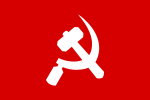- Communist Party of Nepal (Masal) (historical)
-
For other uses, see Communist Party of Nepal (disambiguation).Communism in NepalLeadersCurrent groupsDefunct groupsRelated articles
Communist Party of Nepal (Masal), was a communist party in Nepal. CPN (Masal) was formed in 1983, following a split in the Communist Party of Nepal (Fourth Convention). The party was led by Mohan Bikram Singh.
In 1984 CPN (Masal) was one of the founding parties of the Revolutionary Internationalist Movement.
In 1985 the party split into Communist Party of Nepal (Masal) (led by MBS, which was in minority) and Communist Party of Nepal (Mashal) (led by Mohan Vaidya). Masal retained the RIM membership for some time. Masal was sometimes nicknamed Patalo Masal ('Thin Masal') to differentiate it from Moto Masal ('Thick Masal), i.e. Masal.
Following the split, the Masal group was also known as Communist Party of Nepal (Mashal-COC).
At the time of the mass upsurge against the monarchic dictatorship, Masal, Mashal and Communist Party of Nepal (Marxist-Leninist-Maoist) joined hands and formed the United National People's Movement as a common front.
In 1991 a minority broke led by Dr. Baburam Bhattarai broke away from CPN(Masal) and joined the Communist Party of Nepal (Unity Centre).
CPN(Masal) took part in the Joint People's Agitation Committee, which had called for a general strike on April 6, 1992. Violence erupted in the capital during the strike, and according to the human rights NGO HURON 14 people were killed in police firing.[1]
In 1999 CPN(Masal) split, as a group led by Deena Nath Sharma broke away and formed a parallel Communist Party of Nepal (Masal). Sharma's group called for boycott of elections and support to armed struggle led by Communist Party of Nepal (Maoist). It later merged with the Maoists.
At the party convention held December 1-December 5, 2001 CPN(Masal) decided to merge with Communist Party of Nepal (Unity Centre).[2] The merger became effective in early 2002, and the Communist Party of Nepal (Unity Centre-Masal) was formed.
Social analysis
The party considered Nepal as a semi-feudal and semi-colonial country. The party identified the proletariat, peasants (ranging from poor to rich), petty bourgeoise and national capitalists as friendly classes, and saw feudal landlords and comprador-bureaucratic capitalists as class enemies.[3]
References
- ^ Hoftun, Martin, William Raeper and John Whelpton. People, politics and ideology: Democracy and Social Change in Nepal. Kathmandu: Mandala Book Point, 1999. p. 189
- ^ Unity Centre and Masal to Unite - Nepali Times
- ^ Rawal, Bhim. The Communist Movement in Nepal: Origin and Development. Kathmandu: Accham-Kathmandu Contact Forum, 2007. p. 119.
See also
Cailmail, Benoît. Autumn 2008 – Spring 2009. "Mohan Bikram Singh and the History of Nepalese Maoism". European Bulletin of Himalayan Research. n° 33-34, pp. 11–38.
Categories:- Communist parties in Nepal
Wikimedia Foundation. 2010.

